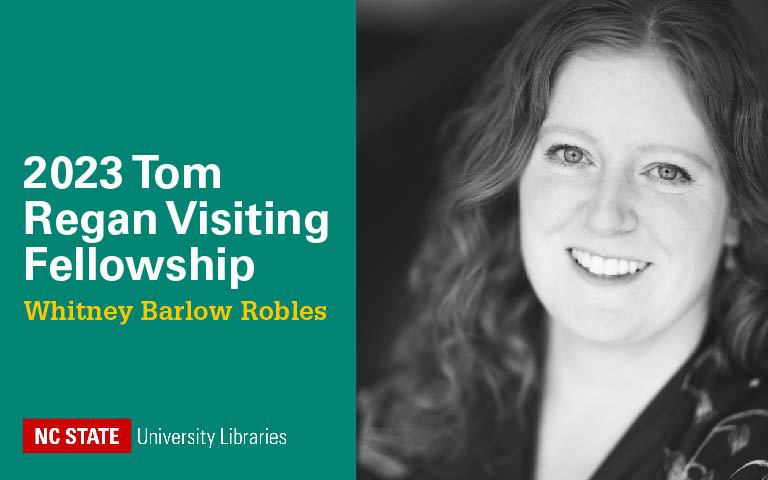
Scholar and author Whitney Barlow Robles is the 2023 Tom Regan Visiting Fellow

Scholar and author Whitney Barlow Robles is the 2023 Tom Regan Visiting Fellow
The Libraries has awarded the 2023 Tom Regan Visiting Research Fellowship to Whitney Barlow Robles, a Lecturer in the Department of History at Dartmouth College. Robles will visit the Libraries for her month-long fellowship in the late summer of 2023.
Intended to promote scholarly research in animal rights, the fellowship has been established through the generosity of the Culture & Animals Foundation (CAF) in memory of scholar, author and former NC State philosophy faculty member Tom Regan. The fellowship specifically supports the use of the Libraries’ Special Collections Research Center (SCRC) Animal Rights Archive—the largest scholarly archive of animal rights collections in the country.
The annual Tom Regan Visiting Research Fellowship debuted in 2019, when inaugural fellow Utah State professor Rachel Robison-Greene visited the SCRC to work on a critical analysis of in vitro, or “cultured,” meat. Each fellowship provides a stipend awarded to a qualified applicant for research completed in residence at the SCRC for a term of no less than four weeks to begin on or after July 1.
Robles is a Lecturer in the Department of History at Dartmouth College. Her work uncovers the entangled histories of science, the environment, colonialism, and material culture. Robles’ first book, Curious Species: How Animals Made Natural History, is forthcoming with Yale University Press this year. Part history and part personal narrative, it shows how creatures like corals, rattlesnakes, fish, and raccoons have shaped the birth of natural history, with lingering consequences for our own understanding of animals and environmental crisis today.
Robles has a Ph.D. in American Studies and an A.M. in History from Harvard University and a B.A. in American Studies (with a concentration in nature writing) from Yale University. In addition to her extensive academic writing, she has also been a science editor for a global health laboratory at Caltech and a freelance science and nature writer. While working as a writer and editor at the American Museum of Natural History in New York, Robles has done feature writing for general audiences about topics such as firefly sex, flavor perception, and terraforming Mars.
“We are so pleased to host Dr. Robles as this year’s Tom Regan Fellow,” says Gwynn Thayer, SCRC Associate Head and Chief Curator. “Her proposal stood out for its originality and applicability to the archival resources that we have available here in Special Collections. We look forward to meeting Whitney and supporting her fascinating research project.”
Robles plans to use her fellowship month to do research toward her second book, The Collector's Paradox: Specimens, Species, and Loss, which explores specimen collecting's contradictory relationship with both preservation and destruction.
“I first conceived of this project when reflecting on this irony that, legally speaking, to protect a species of animal and to institute any sort of conservation efforts under the Endangered Species Act or other frameworks, you have to have a name for what it is that you're protecting. You have to know what it is that you're conserving. And so to have a name for an animal, you need a dead specimen, or usually multiple specimens, to be deposited in a museum collection. So saving animals requires killing them,” Robles says.
Robles will investigate the ethics of the history of collecting through the lens of this paradox by examining SCRC holdings of researchers such as Catherine Roberts.
“I am really interested in her papers because she sits at this nexus—she was trained as a geneticist and a bona fide scientist, but then also a philosopher and ethicist,” Robles says. “And this project sits at the junction of those things, and of more humanities-oriented ethics and philosophical questions. But then putting that in conversation with day-to-day scientific practice. Roberts has a 1967 book, The Scientific Conscience: Reflections on the Modern Biologist and Humanism—I’d like to see if there are any writings related to these questions of the ethics of sacrificing one individual animal to create this species unit that can then be conserved.”
Robles is curious to find material that shows the pathos of the natural sciences throughout history. The 18th-century Quaker naturalist John Bartram, for instance, wrote of the pains he had to enact on animals to generate specimens. This line of concern continues into the present day.
“How do you feel that you have to take specimens of this group of animals that you've devoted your life to studying?” she says. “I really want to try to excavate that human side of the sciences. In the scientific papers we read, they're often presented as objective and cold—but science is an emotional activity. Scientists and biologists get into studying animals because they care about them.”
In addition to the papers of specific scientists and naturalists, Robles is interested in key documents in the Animal Welfare Institute Records about collecting wild animals and species endangerment as well as other collections that focus on laboratory animal research, vivisection and the anti-vivisection movement, hunting and conservation societies that intersect with debates about scientific collecting and research. But she’s also excited about the unanticipated discoveries she will make through the opportunity of the Regan Fellowship.
“Often when you're a historian planning out a trip to an archive, you don't really know what you're going to find,” Robles says. “The archives website is really great in detail. But it's really a matter of canvassing and thinking about some key figures that are taking part in these discussions. Fingers crossed that their papers are going to talk about the specific questions I'm interested in. I just feel so fortunate that I can spend a full month in an archive that is entirely devoted to animals.”